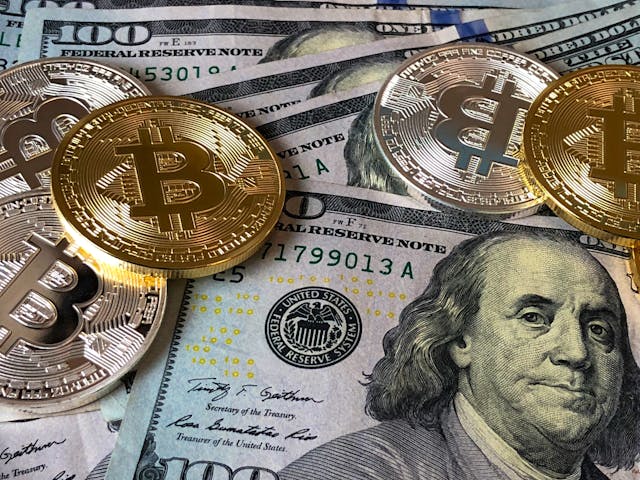Bitcoin vs. Gold: Which is the Better Hedge Against Inflation?
In times of economic uncertainty and rising inflation, investors often seek safe-haven assets to preserve their wealth. Traditionally, gold has been the go-to asset for hedging against inflation due to its stability, rarity, and historical significance. However, in the digital age, Bitcoin has emerged as a new contender for the title of the ultimate hedge against inflation. Both assets have their unique advantages and disadvantages, and opinions are divided on which is the better choice. In this blog post, we’ll explore the debate of Bitcoin vs. Gold and analyze which asset might be the superior hedge against inflation.
Understanding Inflation and the Need for a Hedge
Before diving into the comparison between Bitcoin and gold, it’s important to understand what inflation is and why investors seek to hedge against it. Inflation is the rate at which the general level of prices for goods and services rises, eroding purchasing power. When inflation rises, each unit of currency buys fewer goods and services, leading to a decrease in the value of money.
Why Hedge Against Inflation?
- Preserve Wealth: Inflation reduces the value of money over time, eroding savings. A hedge can help preserve purchasing power.
- Maintain Portfolio Stability: Safe-haven assets can provide stability to an investment portfolio during times of economic turmoil.
- Diversify Investments: Hedging against inflation provides diversification, reducing overall investment risk.
Gold: The Traditional Hedge Against Inflation
Gold has been considered a reliable store of value for centuries. Its role as a hedge against inflation is well-established, largely because of its inherent properties and historical precedent.
Key Advantages of Gold as an Inflation Hedge:
- Long Track Record: Gold has been used as money and a store of value for over 5,000 years. Its historical stability makes it a trusted asset in uncertain times.
- Intrinsic Value: Unlike fiat currencies, which can be printed at will by central banks, gold is a physical asset with intrinsic value.
- Limited Supply: Gold is a scarce resource, and the amount of gold mined each year is relatively small compared to the existing supply, which helps maintain its value.
- Low Volatility: While gold prices can fluctuate, they are generally less volatile than many other assets, providing a stable hedge against inflation.
Drawbacks of Gold as an Inflation Hedge:
- Storage and Security Costs: Holding physical gold comes with storage and insurance costs, which can eat into returns.
- Limited Upside Potential: While gold preserves value, it does not generate returns like stocks or bonds. Its price tends to rise slowly over time, limiting upside potential.
- Lack of Modern Utility: Unlike Bitcoin, gold does not have modern digital utility in today’s financial systems.
Bitcoin: The Digital Gold?
Bitcoin, often referred to as “digital gold,” has become increasingly popular as a hedge against inflation. Introduced in 2009 by an anonymous entity known as Satoshi Nakamoto, Bitcoin is a decentralized digital currency that operates on a peer-to-peer network.
Key Advantages of Bitcoin as an Inflation Hedge:
- Fixed Supply: Bitcoin has a maximum supply of 21 million coins, which creates artificial scarcity. This fixed supply makes it immune to inflationary pressures caused by an increase in supply, unlike fiat currencies.
- Portability and Divisibility: Bitcoin is highly portable and divisible, making it easier to store, transfer, and trade compared to physical gold.
- Decentralization: Bitcoin is not controlled by any central authority, government, or institution. This decentralization provides a hedge against political and economic risks that can impact fiat currencies.
- High Growth Potential: Bitcoin has shown exponential growth in value over the past decade, driven by increasing adoption, technological advancements, and growing institutional interest.
Drawbacks of Bitcoin as an Inflation Hedge:
- High Volatility: Bitcoin is notoriously volatile, with frequent and significant price swings. This volatility can be unsettling for investors looking for stable inflation protection.
- Regulatory Risks: Governments and regulators worldwide are still grappling with how to regulate Bitcoin, and future regulatory changes could impact its value and acceptance.
- Security Concerns: While Bitcoin itself is secure, investors need to be vigilant about cybersecurity risks, such as hacking and phishing, when holding digital assets.
- Short Track Record: Compared to gold, Bitcoin is still relatively new and untested as a long-term hedge against inflation.
Bitcoin vs. Gold: Comparing Their Effectiveness as Inflation Hedges
To determine which asset is the better hedge against inflation, let’s compare Bitcoin and gold across several key factors:
1. Store of Value
- Gold: Gold has a proven track record of preserving value over long periods. It is not dependent on technological infrastructure and has intrinsic value due to its physical properties.
- Bitcoin: Bitcoin’s fixed supply makes it a strong contender as a store of value. However, its volatility poses a challenge, especially for those looking for stability.
Winner: Gold, for its stability and historical performance.
2. Liquidity and Accessibility
- Gold: Gold is highly liquid but can be cumbersome to trade, store, and transport due to its physical nature.
- Bitcoin: Bitcoin is highly liquid and can be traded 24/7 across global exchanges. Its digital nature makes it highly accessible and easy to store.
Winner: Bitcoin, for its superior liquidity and accessibility.
3. Volatility
- Gold: Gold is generally less volatile than Bitcoin and tends to retain its value over time.
- Bitcoin: Bitcoin is highly volatile, which can be both a risk and an opportunity for investors. Its price can swing wildly in response to news, sentiment, and market dynamics.
Winner: Gold, for its lower volatility.
4. Upside Potential
- Gold: Gold’s upside potential is limited. It tends to move slowly and is more of a capital preservation tool.
- Bitcoin: Bitcoin’s price growth potential is much higher, especially as adoption increases and institutional interest grows. It has delivered significant returns for early investors and continues to attract interest.
Winner: Bitcoin, for its potential for high returns.
5. Regulatory Environment
- Gold: Gold is well-regulated and widely accepted as a valuable asset globally.
- Bitcoin: Bitcoin faces an uncertain regulatory future, which could impact its adoption and price stability.
Winner: Gold, for its established regulatory status.
Which Is the Better Hedge Against Inflation: Bitcoin or Gold?
The answer depends on an investor’s risk tolerance, investment goals, and time horizon. Both Bitcoin and gold offer unique benefits and serve different purposes in an investment portfolio.
- For Risk-Averse Investors: Gold remains the safer bet for those seeking stability, a long track record, and lower volatility. It is a proven hedge against inflation, especially in times of economic crisis.
- For Risk-Tolerant Investors: Bitcoin presents a compelling alternative for those willing to accept higher risk for potentially higher rewards. Its fixed supply, decentralization, and growth potential make it a valuable hedge against the debasement of fiat currencies.
Conclusion
In the debate of Bitcoin vs. Gold as a hedge against inflation, there is no one-size-fits-all answer. Both assets have their place in a diversified portfolio. Gold provides the safety and stability of a time-tested inflation hedge, while Bitcoin offers the innovation and growth potential of a new digital asset class. Investors should consider their financial goals, risk appetite, and market outlook when choosing between Bitcoin and gold or deciding to hold both for a balanced approach to hedging against inflation.























